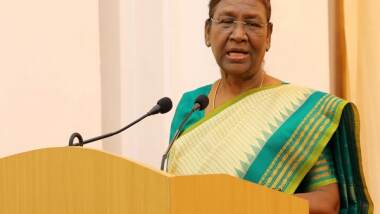New Delhi [India], November 28 (ANI): President Droupadi Murmu on Tuesday praised the Supreme Court for publishing verdicts in various regional languages on its website adding that as the language of the higher judiciary is English, making it difficult for a large section of society to understand the judicial processes.
President Murmu was speaking at the Valedictory session of the first regional conference on access to legal aid.
President said that there are many more hindrances in the way of equal access to justice in India. For example, the language of the higher judiciary is English, which makes it difficult for a large section of society to understand the judicial processes, she said. However, the Supreme Court has started publishing verdicts in various regional languages on its website, she said.
Speaking on the occasion, the President said that making legal aid accessible to people in need is the cornerstone of any modern state. It plays a crucial role in shaping a social order which is equitable, just and worthy of trust. She stated that participation of 69 Africa-Asia-Pacific countries of the Global South in this conference is a significant milestone in our collective pursuit of justice and equality.
Speaking about access to justice, the President said that equality is not only the foundation of justice, but a necessary condition of justice too. It has been long since the world proclaimed that all human beings are equal, but we need to ask ourselves if we all have equal access to justice. In practice, it means some people are often unable to seek redressal of their grievances due to several factors. Our principal task is to remove those obstacles.
The President said that there is a need to launch an awareness campaign among people not only to make them conscious of their rights, but also to help them get legal assistance if such a need arises. Such an awareness campaign must focus on rural areas and socially disadvantaged groups to dispel the impression that justice is the advantage of the stronger.
The President said that technology holds great promise in making access to legal aid more democratic. It has reduced distances and made justice dispensation easier in many cases. She expressed confidence that an innovative attitude in the integration of technology in the justice delivery system will make it more inclusive as well as more efficient.
Speaking at the event, Union Law Minister of State Arjun Ram Meghwal also expressed happiness that the Supreme Court has translated judgments in regional languages and other nations also desired that they too would like to translate judgments in regional languages.
Speaking about the event, President Murmu said that the National Legal Services Authority, India (NALSA), has played a key role in expanding legal aid.
Addressing the gathering, Chief Justice of India DY Chandrachud said that the occasion reflected the collective commitment of nations in the global South to address critical challenges surrounding legal aid and justice.
He said that the conference has served as a vital reminder of the importance of cross-fertilization of legal traditions, legal doctrine and unique administrative measures between different nations.
CJI Chandrachud also mentioned President Murmu's speech at the 2022 Constitution Day function where she appealed to the judiciary to help people languishing in jails for petty offences who are not aware of their fundamental rights.
CJI said that he has been told that several plenary meetings at this conference discuss strategies to overcome these hurdles.
CJI said that certain ingenious ideas were floated. He highlighted two of them. Uganda's Justice Defenders have started a law firm within a prison project that trains jail inmates to self-represent their cases. International Legal Foundations Holistic Defense model, widely successful in Afghanistan and Myanmar, provides client-centric aid by roping in various government agencies and mental health care institutions at both the pre-trial and post-trial stage, CJI mentioned.
CJI said that for many reasons the global South has become a north star all across the globe.
He also mentioned a remarkable illustration of trans-judicial communication including one of the Supreme Court of Jamaica delving into the reasoning of the dissent in the Aadhar case to declare that its National Identification and Registration Act was unconstitutional. Sri Lankan Supreme Court discussed as many as 20 Indian cases that involved Article 14 of the Indian Constitution in a case about equality of opportunity in university admissions, CJI mentioned.
The National Legal Services Authority, India (NALSA) together with the International Legal Foundation (ILF), the United Nations Development Programme (UNDP) and the United Nations Children's Fund (UNICEF) hosted the first regional conference on Access to Legal Aid at Delhi on November 27 and November 28, 2023 with the goal to address the challenges in ensuring access to quality legal aid services in the countries of the Global South.
The conference has brought together Chief Justices, Ministers of Justice, legal aid officers, policymakers, and civil society experts from 70 Africa-Asia-Pacific countries of the Global South to discuss the challenges and opportunities in ensuring access to quality legal aid servicesfor the poor and vulnerable. The conference provided a platform for sharing bestpractices and identifying innovative solutions to improve access to justice in the participating countries.
More than 200 delegates have participated in the two-day Conference. (ANI)
(This is an unedited and auto-generated story from Syndicated News feed, LatestLY Staff may not have modified or edited the content body)













 Quickly
Quickly

















